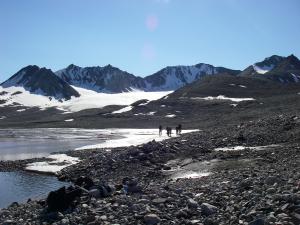
Welcome to the Earth Science Collection, a library of resources for educators and the public interested in learning more about the diverse science disciplines that help us understand the earth's unique polar regions. The field of earth science has overlap into many disciplines and can include geology, oceanography, glaciology, and meteorology.
The Collection includes individual activities, lesson plans, journal entries, videos, and presentations that will educate the next generation about this complex field of study. All materials are created and compiled by world-class educators participating in authentic scientific research in the polar regions through PolarTREC expeditions.
The Earth Science Collection is utilized as class material in the Cyber-based Interdisciplinary Science Education Professional Development Courses offered through the University of Alaska- Fairbanks in conjunction with PolarTREC. The collection is funded by the Arctic Research Consortium of the United States and the National Science Foundation Office of Polar Programs.


![]()
